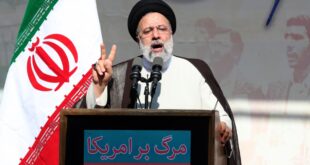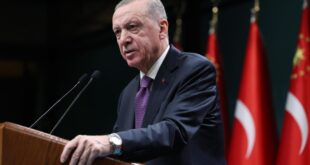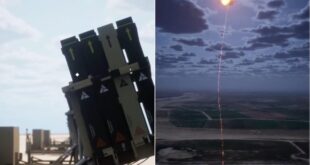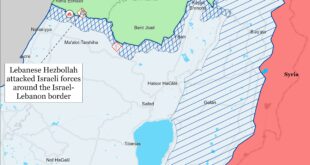Tensions between Israel and Syria are escalating and show little sign of slowing. Suspected Israeli strikes June 30 in Syria killed 15 people, the UK-based Syrian Observatory of Human Rights said.
Syria responded by firing anti-aircraft missiles, one of which crashed in northern Cyprus.
A headquarters and a research centre of Iran’s Islamic Revolutionary Guard Corps (IRGC) in a southern suburb of Damascus were hit, along with a military airport and munitions warehouses, operated by Hezbollah forces near Homs in the Israeli suspected attack, the Observatory reported.
Syria termed the attack as “state terrorism” and lodged a complaint with the United Nations.
The strikes June 30 were the latest in a long series of attacks Israel is said to have undertaken against Iranian targets and those of Tehran’s allies in Syria as it seeks to push the Iranians back from its borders.
What separates the exchange from its predecessors is an international context that has rarely experienced more tension. Analysts cautioned that any weapons fire between Israel and Iran and its allies could be used as a pretext for further escalation.
These June 30 strikes come amid what appears to be a scaling down of Iranian and Hezbollah presence in Syria.
Nevertheless, despite a reduction in numbers, “Hezbollah now operates right by the border in two concerning ways gathering intelligence and training for cross-border attacks,” said Shira Efron, a researcher with the RAND Corporation.
She said there are estimates in Israel that claim Hezbollah has set up approximately 20 observation posts 3-5km from the border.
While many of the posts are manned by Syrian troops, Efron said, they occasionally mix their numbers with Hezbollah’s fighters, taking orders directly from the Lebanese group.
“In addition, Hezbollah continues to build up its attack forces in the Golan with an operational unit that is composed of primarily Syrian troops with Lebanese commanders who are training likely to execute terror attacks in Israel in the event of escalation,” Efron said.
Syria did not respond to the incursion with its Russian S-300 missile defence system but rather, as debris from the missile that crashed in Cyprus indicated, its S-200 Soviet-era defence system.
Jeremy Binnie, Middle East & Africa Editor with Jane’s Defence Weekly, said a possible reason for using the S-200 was “though Russian sources have suggested multiple (S-300) systems have been delivered, only one active battery in Syria has been located through open source research.” Also, the Russians retained control over it because they don’t want a repeat of the Il-26 shoot-down, when a Russian plane was accidentally downed by Syrian missiles responding to an alleged Israeli strike in September 2018, which prompted the S-300 delivery, Binnie said.
However, this incident clearly demonstrates that the Syrians are willing to throw S-200 missiles around, he said.
Tensions across the Gulf are at a high. In May, the United States sent the USS Abraham Lincoln carrier group to the region, where it remains in the Gulf of Oman following attacks on oil tankers in the area.
Iranian President Hassan Rohani warned the United States and Europe on July 3, that, after the de facto breakdown of the 2015 nuclear deal, Iran felt free to enrich its uranium stocks to whatever degree it felt necessary if a new deal couldn’t be agreed.
US President Donald Trump answered: “Be careful with the threats, Iran. They can come back to bite you like nobody has been bitten before!”
In this context, any confrontation between Israel and its opponents in Syria carries increased meaning. “There is a risk of further escalation that is related to the larger regional context,” Efron said.
“Israel remains on high alert that, given rising tensions in the Gulf, Iran will try to provoke Israel through its proxies in Syria — Hezbollah, Shia militias — or the Palestinian Islamic Jihad in Gaza,” she said.
 Eurasia Press & News
Eurasia Press & News



